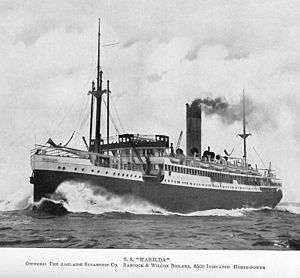HMAT Warilda
HMAT Warilda (His Majesty's Australian Transport) was a 7713-ton vessel, built by William Beardmore and Company in Glasgow as the SS Warilda for the Adelaide Steamship Company.[2] She was designed for the East-West Australian coastal service, but following the start of the First World War, she was converted into a troopship and later, in 1916, she was converted into a hospital ship.
 | |
| History | |
|---|---|
| Name: | Warilda |
| Operator: |
|
| Builder: | William Beardmore and Company, Glasgow |
| Yard number: | 505 |
| Launched: | 5 December 1911 |
| Maiden voyage: | 1912 |
| Fate: | Torpedoed by German U-boat UC-49 on 3 August 1918.[1] |
| General characteristics | |
| Tonnage: | 7713 tons gross |
| Length: | 411 feet 3 inches (125.35 m) |
| Beam: | 56 feet 7 inches (17.25 m) |
| Draught: | 34 feet 1 inch (10.39 m) |
| Installed power: | 626 nhp on 6 coal-fired boilers |
| Propulsion: | Twin quadruple expansion engines |
| Speed: |
|
Her identical sister ships, also built by William Beardmore and Company, were SS Wandilla (1912) and SS Willochra (1913).
Time as a troopship
- 5 October 1915: 10th Reinforcements, 9th Battalion embarked from Brisbane heading to Egypt.:[3] 15 Batt embarked Brisbane HMAT A69 Warilda same date[4]
- 8 October 1915: 10th Reinforcements, 1st Infantry Battalion embarked from Sydney heading to Egypt.[5]
- 8 November 1915: 10th Reinforcements, 1st Brigade of the AIF, embarked from Liverpool, NSW, Australia. The ship arrived at Fremantle, Western Australia on 15 October 1915, and reached Suez on 5 November, when the troops were disembarked.[6]
- 25 May 1916: Tunneling Companies, 2 Reinforcements embarked Melbourne.[7]
- 1 June 1916: Tunneling Company 6, 3rd Tunneling Company embarked from Fremantle, Western Australia 1 June 1916. Disembarked Plymouth, England, 18 July 1916.[8]
Sinking
On 3 August 1918, she was transporting wounded soldiers from Le Havre, France to Southampton when she was torpedoed by the German submarine UC-49.[9] This was despite being marked clearly with the Red Cross; as with a number of other hospital ships torpedoed during the war, Germany claimed the ships were also carrying arms.[10]
The ship sank in about two hours, and of the 801 persons on board, 123 died when the Warilda sank.[1] The Deputy Chief Controller of the Queen Mary's Army Auxiliary Corp, Mrs Violet Long, lost her life in this action.[11] Amongst the survivors was her commander, Captain Sim, who was later awarded the OBE by King George V.[12] Her wreck lies in the English Channel[13]
Images


References
- Milward, Jennifer (1 August 2014). "SS Warilda: troopship, hospital ship, ambulance transport, wreck". Australian War Memorial. Retrieved 2 December 2018.
- Memorial to the Warilda Archived 17 December 2006 at the Wayback Machine
- "Bede Septimus Connell's obituary". Archived from the original on 20 September 2006. Retrieved 10 October 2006.
- WW1 War Service Record SMITH HJ 3093
- Private Cecil Henry obituary
- A history of John Robertson Hawke, AIF
- Corporal ARTHUR WILLIAM JAMES MAGGS' obituary
- "Sgt Joseph ALLEN obituary". Archived from the original on 21 August 2006. Retrieved 6 January 2020.
- "Adventuredivers.co.uk, Warilda". Archived from the original on 20 June 2006. Retrieved 9 October 2006.
- "Adventuredivers.co.uk, Lanfranc". Archived from the original on 19 February 2006. Retrieved 9 October 2006.
- War Wrecks at netspace.net.au
- Dictionary of ship names
- "Wounded drown at night". The New York Times. 6 August 1918. Retrieved 21 August 2009.
External links
| Wikimedia Commons has media related to HMAT Warilda (ship, 1911). |